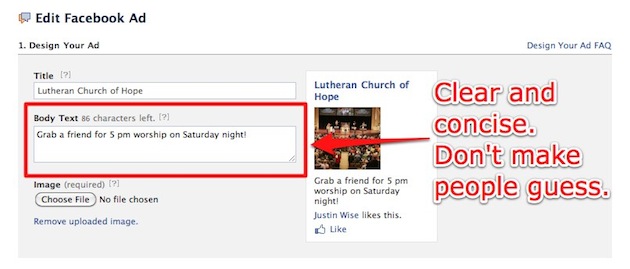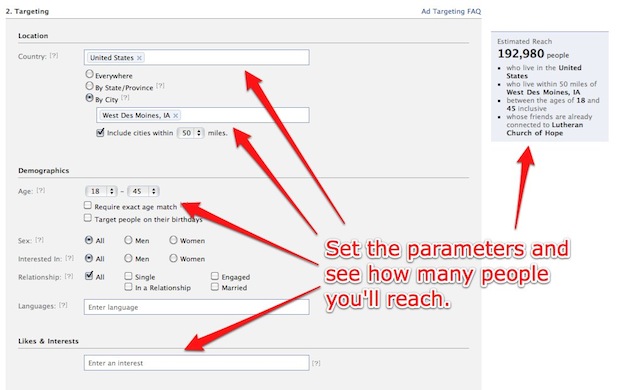Let’s face it, you need to tell people about your church. As much as we’d all like to think our church is the exception to the rule, it’s not. In order to get people coming in, you have to get the word out.
Traditionally, church planters and church marketing departments have gone about using the traditional methods to get the word out about their services. Sometimes they work. Sometimes they don’t. Truth be told, there’s noreal way of knowing. (How do you measure the ROI of a direct mailer aside from asking every person who comes to your church how they found out?)
I realize I’m over-simplifying general marketing practices, but it’s for a point. With the advent of Facebook ads, churches have an affordable and measurable way to let the general population know about what’s going on in their church.
You’ve all heard the statistics. So have I. But they bear repeating to illustrate what we’re about to cover.
- Facebook has over 500 million registered users. If it were a country, that number would put Facebook as the third largest in the world.
- There are over 200 million active daily users. what’s the difference from the stat above? It means that 200 million people are logging on every day to do something on Facebook. Think of it as the difference between your church’s membership role (registered users) and weekly attendance (active daily users).
- Each of those 200 million daily users are spending and average of 56 minutes per day on Facebook.
- Lastly, Facebook accounts for approximately 21% of page views on the web. Yes, the whole Internet.
That’s a lot of eyeballs.
You can see why Facebook ads is such a big deal. Mark Zuckerberg and company offer one of the largest global audiences to their user base and they offer it at an affordable rate. And you can try it for free. Stick around to the end for a discount code.
Facebook Ads at Church: A Case Study
For our church, we wanted to test the waters with Facebook ads by promoting our Saturday night service. It’s traditionally one of the lower-attended services and typically brings in a younger crowd. A perfect demographic to give the ads a try.
Here’s how we did it:
1. Log on to Facebook.com/Ads
You’re given the option to start a new campaign or manage a new one. Since we’d never created an ad for our church, I chose to create a new one.
The other thing you should know is that you can add as many administrators to your advertising page as you’d like. So if you create the ad and move away to Budapest, your church is not beholden to come to you every time they need a change made to the ad page. Before you start out, you may want to choose one or two other people on staff who can help you manage your ads. This is not unlike administering a Facebook fan page.
2. Write Your Copy

This might be the most important part of the ad. You need to communicate a strong, inviting and clear message all within a space smaller than a tweet (135 characters.)
If you’re not a writer, grab someone on your staff or in your church who is. Identify what the message is you want to communicate to the people who will be seeing your ad (we’ll cover that in the next section) and make it pop. If studies are correct, you’ll have about 2-3 seconds to grab someone’s attention. That’s it.
For our ad, I chose a very simple and clear call-to-action:
Grab a friend for 5 pm worship on Saturday night!
I chose the words “friend” and “Saturday night” strategically, as we’ll be broadcasting this ad to people who aren’t currently connected to our church’s Facebook fan page.
3. Choose Your Demographic

This is where the functionality of Facebook ads really shines through. This is where you’ll be deciding who sees your ad and who doesn’t.
Because of the large user base, Facebook has access to literally every demographic you can think of:
- Geography
- Age
- Gender
- Education level
- Marital status
- What fan pages and groups the person is or is not connected to
- And on, and on
We chose to narrow ours down to people who lived within 50 miles of West Des Moines (where Hope is located), who were between the ages of 18 and 45, and whose friends were already connected to our church’s Facebook fan page. Facebook provides a “reach counter” and with these parameters, we had access to over 190,000 people.
Not a bad reach.
4. Set Your Budget and Tweak as Necessary

This functionality is why I love Facebook ads so much. Not unlike AdWords, Facebook allows you to set your budget to whatever you’d like to pay. You can do this in two ways:
- Pay for impressions (CPM) – This is how many people actually see your ad.
- Pay for clicks (CPC) – This is how many people actually click on your ad and go to wherever it is your ad directs them to.
I chose CPC for this ad because I want to gauge the effectiveness of my ad and tweak as necessary. I have our ad sending people to our Facebook fan page when they click it. I’ll know at the end of the ad campaign if we’re effective if “likes” go up on our fan page and if more people attend our Saturday night service. It’s that simple.
Of course, as the campaign proceeds, I can tweak the ad as necessary. If I’m finding that people aren’t responding well to the ad, I can change the image, the copy, the demographic I have it restricted to—whatever. Changing an ad midstream is as easy as creating one. Facebook really makes it simple.
Final Thoughts on Facebook Ads
If you’re in a church that has a small budget for marketing, you need to give Facebook ads a try.
If you’re in a church that has plenty of exposure locally but you want to expand the reach of your online campus, you need to give Facebook ads a try.
If you’re in a church that’s trying to reach people with a pulse, you need to give Facebook ads a try. Notice a theme?
If you give this a shot and run into problems, please feel free to get a hold of me and I’ll do what I can to help. Whether you’re a Facebook beginner or a seasoned pro, Facebook has made it easy to let the world (yes, world) know about what your church is up to.
 In 1775, Catholic settlers, mostly of English and Irish descent, began emigrating chiefly from Maryland to Kentucky, an outpost of the crown colony of Virginia. The first missionaries came around 1787. In 1808 the four new Catholic dioceses, created at the request of Bishop Carroll of Baltimore, included Bardstown along with Boston, New York, and Philadelphia. The new diocese of Bardstown covered almost the entire Northwest Territory, south to New Orleans and as far north as Detroit.
In 1775, Catholic settlers, mostly of English and Irish descent, began emigrating chiefly from Maryland to Kentucky, an outpost of the crown colony of Virginia. The first missionaries came around 1787. In 1808 the four new Catholic dioceses, created at the request of Bishop Carroll of Baltimore, included Bardstown along with Boston, New York, and Philadelphia. The new diocese of Bardstown covered almost the entire Northwest Territory, south to New Orleans and as far north as Detroit.  The Cathedral was consecrated in 1819, though the interior was not fully completed until 1823. When the Episcopal See was moved forty miles away to the fast growing city of Louisville in 1841, St. Joseph's became a parish church, hence, the title "proto-cathedral." In 1995 Bardstown was named a titular see by the Vatican for its contributions to Catholic Church heritage in America. Once again, Bardstown, only one of three titular dioceses in the U.S., has a bishop, though in an honorary capacity.
The Cathedral was consecrated in 1819, though the interior was not fully completed until 1823. When the Episcopal See was moved forty miles away to the fast growing city of Louisville in 1841, St. Joseph's became a parish church, hence, the title "proto-cathedral." In 1995 Bardstown was named a titular see by the Vatican for its contributions to Catholic Church heritage in America. Once again, Bardstown, only one of three titular dioceses in the U.S., has a bishop, though in an honorary capacity.  It is a beautiful church, inside and out, and contains fine paintings and other gifts from Europe donated by Pope Leo XII, Francis I, King of the Two Sicilies, and King Louis Phillippe of France, among others.
It is a beautiful church, inside and out, and contains fine paintings and other gifts from Europe donated by Pope Leo XII, Francis I, King of the Two Sicilies, and King Louis Phillippe of France, among others.


































